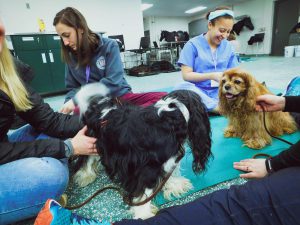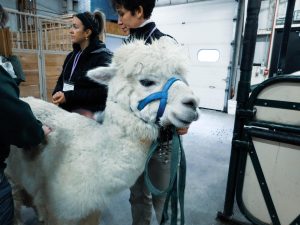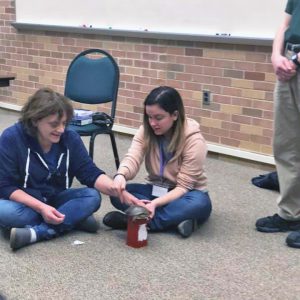
While classrooms were meant to be empty over spring break, a group of third- and fourth-year DVM students from the MSU College of Veterinary Medicine had other plans in mind; they stayed in East Lansing to complete a week-long clinical intensive to earn their certification in Medical Acupuncture for Veterinarians (MAV). The course is the result of a partnership between the College and CuraCore, an integrative medicine and education center in Colorado.
MSU is the first veterinary school to teach a veterinary-medical-student-focused MAV course on-site. “The goal is for students to be able to graduate with the certification,” says Dr. Elizabeth Carr, associate professor for the Department of Large Animal Clinical Sciences and acupuncturist for the MSU Veterinary Medical Center. "Though any veterinary medical student can take a certification course, this is the first time a college and certification program have partnered to teach a program on-site with the primary focus being on DVM students—to help decrease the expense involved in travel and accommodations. In addition, CuraCore gave all students who participated a student group discount.”
CuraCore for Others
As the College is pleased with results from the first installment of the CuraCore program, faculty will further refine and expand it for future offerings to the veterinary medical community. Learn more about CuraCore and MSU's Integrative Medicine Service.
The certification course focused on all species—dogs, cats, horses, cows, sheep, goats, alpacas, raptors, bunnies and even a bearded dragon and a turkey. Before the clinical portion of the program, students completed 12 online modules, so they were well-educated on the use of acupuncture, photo modulation, and integrative medical practices and principles. “They came in with a strong knowledge base, so they could put that knowledge into practice,” says Dr. Sarah Shull, assistant professor for the Department of Small Animal Clinical Sciences and head of the Rehabilitation Service for the Hospital. Students could elect for hands-on experience with dogs and cats, exotics, and/or large animal species, depending on their interests.
The clinical intensive portion of the certification was taught by veterinarians from the College and Dr. Narda G. Robinson, CEO of MAV. “As teaching assistants, we were there to support and help direct them, but the students were really running the show,” says Shull.

The live animals that were used in the course were volunteered by Hospital clients, including two Rehabilitation patients, Bentley and Summer. A student participant also volunteered her dog, Delilah. In this setting, the students did more than just apply their new knowledge of integrative medicine; they interacted with clients in a group setting, took verbal histories, and conducted full-body examinations.
“The benefit of taking this course as a student is that it hones their physical exams skills and brings together all of the other material and practices they’ve been learning throughout veterinary medical school, making things clinically relevant and developing a treatment plan,” says Shull. “These skills, including their one health implications, give students something to integrate in practice, whether that be in research, veterinary healthcare, or veterinary education.”

The real-life applicability of its teachings is at the center of CuraCore’s certification program; Medical Acupuncture for Veterinarians is approved by the Registry of Approved Continuing Education and teaches students about how acupuncture works from a rational, evidence-informed perspective. It also guides students through the principles and significance of acupuncture anatomy, neurophysiology, and neuromodulation in a comprehensive way. “It was important to work with a program that was interested in presenting the scientific evidence behind integrative medicine, as we try to emphasize critical thinking in the DVM curriculum.” says Carr.
